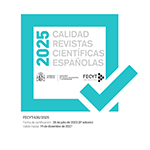'Getting through to the other side of knowledge': Lyotard and Foucault between Rhetorics and Sophistry
Abstract
Almost simultaneously, at the beginning of the so-called post-structuralism, French philosophers Michel Foucault and Jean-François Lyotard became interested in sophistry. Just as he first maintained the classic confrontation between philosophical and sophistry thinking with a view to consolidating his own approach to the question of “truth”, the second author tried to tear down the boundaries between both knowledge. What was at stake in these two conflicting readings was a reflection on the means available to Philosophy to intervene in the political sphere. For Foucault, it is telling the truth to the politician “in a parrhesiastical way” what characterizes the philosopher in front of sophists and guarantees an influence in a government of the straight polis. On the other hand, Lyotard, from his idea of “pagan” politics, believes it is necessary to operate a sophistical turn on philosophy so that it, from a position no longer outside, as an advisor, of politics can bring about otherwise impossible transformations. This article analyzes the readings that the two French thinkers offered from Sophistry and have so far received little attention.
Downloads
Article download
License
In order to support the global exchange of knowledge, the journal Logos. Anales del Seminario de Metafísica is allowing unrestricted access to its content as from its publication in this electronic edition, and as such it is an open-access journal. The originals published in this journal are the property of the Complutense University of Madrid and any reproduction thereof in full or in part must cite the source. All content is distributed under a Creative Commons Attribution 4.0 use and distribution licence (CC BY 4.0). This circumstance must be expressly stated in these terms where necessary. You can view the summary and the complete legal text of the licence.











